
- This event has passed.
AASHTO-ASDWA Webinar: How State Highway and Drinking Water Programs Can Work Together for Mutual Benefits and Reduce Impacts from Road Salt
March 8, 2018 @ 2:00 pm - 3:30 pm EST
AASHTO-ASDWA Webinar: How State Highway and Drinking Water Programs Can Work Together for Mutual Benefits and Reduce Impacts from Road Salt
Original Broadcast: Thursday, March 8, 2018
Slide Deck: AASHTO-ASDWA Road Salt Webinar – March 2018
The American Association of State Highway and Transportation Officials (AASHTO) Center for Environmental Excellence (CEE) and the Association of State Drinking Water Administrators (ASDWA) are pleased to announce a free webinar entitled, “How State Highway and Drinking Water Programs Can Work Together for Mutual Benefits and Reduce Impacts from Road Salt.” The webinar will include an introduction from AASHTO, a brief presentation about ASDWA’s new handout and web page on the “Intersection of Roads and Drinking Water,” and feature presentations from representatives for each of the state programs in New Hampshire and Maryland, who will share how they work together, along with a few examples and some more specific information on best practices for road salt applications and impacts to drinking water. State drinking water program and state highway program personnel are encouraged to attend, along with anyone else who is interested and would like to participate.
Webinar Presentations
New Hampshire’s Experience and Approaches to Reducing Salt Impacts Upon Drinking Water Resources: Pierce Rigrod, a Supervisor with the Drinking Water & Groundwater Bureau in the New Hampshire Department of Environmental Services (NHDES) and Caleb Dobbins, the State Highway Maintenance Engineer for the New Hampshire Department of Transportation (NHDOT), will share how NHDES and NHDOT have been working together to protect drinking water for over 20 years through a mutually agreed upon set of source protection measures that apply to common road construction projects and have coordinated closely on major interstate projects to minimize salt impacts upon nearby community wells and reservoirs. The presentation will discuss the way the two agencies operate and coordinate on winter maintenance activities to minimize salt use and work to prevent salt impacts upon drinking water resources, and will focus on policy, project reviews, equipment, technology and design changes.
Managing Chloride in Maryland’s Surface Waters: Lee Currey, Director of the Water and Science Administration for the Maryland Department of Environment, will present how increasing chloride levels are leading to degraded water quality in Maryland’s drinking water reservoirs, and in its streams and rivers, with the potential to adversely impact drinking water systems and aquatic life. Available information and data show this increase is due to winter road salt application. The state is looking for approaches through its MS4 permits to reduce the usage of road salt and quantify the impacts of these efforts.
Maryland Department of Transportation State Highway Administration Salt Management Best Practices: Russ Yurek, the Director of the Office of Maintenance for the State Highway Administration in the Maryland Department of Transportation (MDOT), will provide an overview of MDOT SHA’s best practices used for winter resource management while balancing public safety and environmental stewardship.
Speaker Biographies





